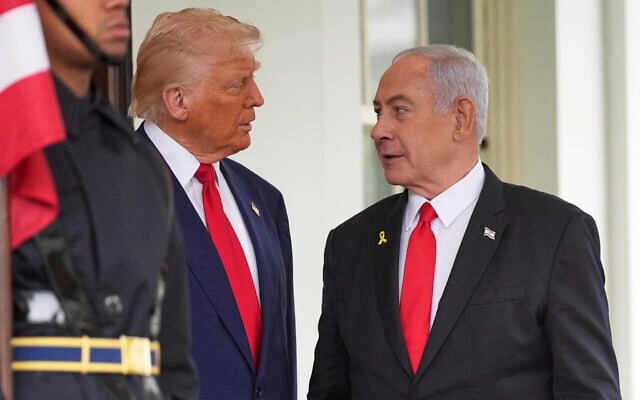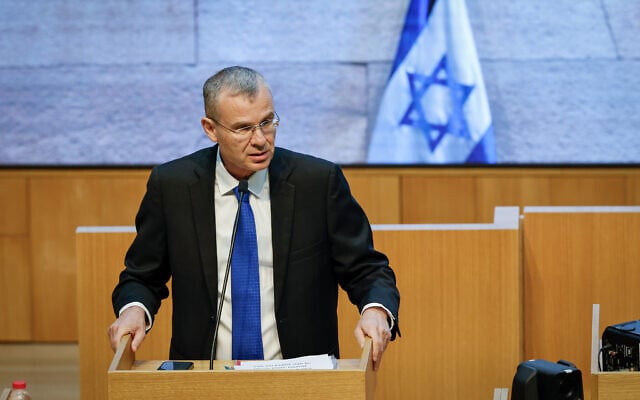



Senior lawmakers and ministers in Prime Minister Benjamin Netanyahu’s Likud party launched a push on Wednesday urging the premier to annex the West Bank before the end of the Knesset’s summer session on July 27, claiming that he must ride the “historic achievements” of the war against Iran.
In a letter signed by all 15 Likud ministers currently in government as well as Knesset Speaker Amir Ohana, the lawmakers wrote that “after the State of Israel’s historic achievements in the face of Iran’s axis of evil and its sympathizers, the task must be completed and the existential threat from within must be eliminated, to prevent another massacre in the heart of the country.”
The politicians added that “the strategic partnership, backing and support of the US and President Donald Trump have made it a propitious time to move forward with it now, and ensure Israel’s security for generations.”
Israel captured the West Bank from Jordan in 1967 during the Six Day War, but has never formally annexed it. Israel began moving toward annexation in 2020 as part of a wider so-called peace plan released by Trump during his previous term, but ultimately dropped the idea in exchange for normalization with the United Arab Emirates and Bahrain.
Wednesday’s letter was met with praise from the far-right Religious Zionism party chair, Finance Minister Bezalel Smotrich, who is also a minister within the Defense Ministry for matters related to the West Bank. He said that as soon as the prime minister “gives the order,” he will be ready to implement Israeli sovereignty over the territory “immediately.”
Netanyahu is slated to depart next week for Washington and meet with Trump in the White House on Monday, with the recent 12-day war with Iran and the US president’s efforts to forge a ceasefire in Gaza expected to be high on the agenda of discussions.
During Trump’s first term in office, the US recognized Israeli sovereignty over the Golan Heights for the first time, a move met with jubilation from Israel’s right-wing lawmakers.
In the days after the ceasefire with Iran went into effect last week, Netanyahu and Trump hinted at a larger regional deal that would end the Gaza war and include normalization or peace deals with new countries, including potentially Syria, Lebanon and Saudi Arabia.
US special envoy Steve Witkoff said last week that he expects “some pretty big announcements on countries that are coming into the Abraham Accords,” while Netanyahu said the Iran war “opens up an opportunity for a dramatic expansion of the peace agreements.”
Israel and Saudi Arabia were believed to be close to normalizing relations before Hamas’s October 7, 2023, attack, which set off the ensuing war in Gaza, currently stretching into its 21st month. One of the major sticking points had been Riyadh’s demand that Israel agree to recognize a Palestinian state.
It appears unlikely that Israel will make any moves to unilaterally annex the West Bank while also pursuing peace deals with Syria and other regional players.
Earlier Wednesday, Justice Minister Yariv Levin made the same public annexation call during a meeting with settler leader Yossi Dagan, the head of the Samaria Regional Council.
“I think that this period, beyond the current issues, is a time of historic opportunity that we must not miss,” said Levin. “The time for sovereignty has come, the time to apply sovereignty. My position on this matter is firm, it is clear.”
Levin said the issue must be “at the top of the priority list.”
“I think it is both realistic and possible,” he added. “And it is essential, first of all, to realize our right to the land. Certainly to contribute to security, and to do justice to the settlers and the settlement [movement] who deserve to be equal citizens in every respect who live in settlements that are part of the fully sovereign State of Israel.”
A number of cabinet ministers and coalition MKs issued a call to annex both the West Bank and the Gaza Strip during a conference of the ultranationalist Sovereignty Movement’s youth chapter, Noar Ribonut, in Sderot last month.
Israel has so far refrained from annexing the West Bank and Gaza — which it withdrew from entirely in 2005 — amid international pressure for the territories to form the base of a Palestinian state and concern for demographic challenges should Israel take in millions more Palestinians.


